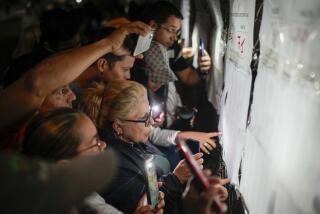Tasting Democracy, Angolans Vote : Africa: After 16 years of war, one-party rule and a tense campaign, first day of balloting is peaceful.
- Share via
LUANDA, Angola — Weary of 16 years of civil war and one-party rule, hundreds of thousands of Angolans eagerly turned out Tuesday to taste democracy for the first time, casting votes under rural baobob trees and in city schoolhouses across this vast country.
The first day of the two-day election, monitored by 800 U.N. officials and foreign observers, was surprisingly peaceful after weeks of tense campaigning and fighting between supporters of the two main candidates, President Jose Eduardo dos Santos and rebel leader Jonas Savimbi.
A large turnout of the 4.8 million registered voters was reported from most of the nation’s 6,000 polling stations, with long lines forming before dawn in some regions.
Enrique Serafina, along with his wife and three children, showed up at 2 a.m. in front of Primary School No. 147 in the seaside capital, Luanda. Dressed in his best clothes, a brown-checked sports jacket over a plaid shirt, he was the first in line.
“I was worried that if I arrived late, I wouldn’t be able to vote, because there are so many people,” said Serafina, 66, who works in a Luanda cassava flour mill.
When the polls opened at 7 a.m., more than 1,000 people were waiting behind Serafina. The mood was upbeat, many voters were smiling and several said they felt that the polling marked the end of a bloody, destructive era in their country’s history.
After this week, Serafina said, “Things will change in all respects. We will have a new government.” And, he added, “We can’t return to war. Too many of our sons already have died.” The short, thin man lost four nephews in the civil war that killed 300,000 Angolans and maimed tens of thousands.
Serafina, like dozens of Angolans interviewed at the polls, declined to reveal his political preference, saying that “my vote is secret.”
The streets of the capital, and of most major cities in the country of 11 million, were deserted Tuesday. All stores, and even the quasi-legal markets, were closed for the two days of voting. The government also closed its borders and its airport to international traffic.
Four hundred U.N. monitors, under the direction of U.N. Special Representative Margaret Anstee, crisscrossed the country in 40 helicopters and nine airplanes, making surprise visits to the polls. About a fifth of the polling stations are in areas accessible only by air; the air operation was the largest in U.N. history, officials said.
The United Nations, assisted by 400 monitors from the United States and other foreign countries, is charged with declaring the elections “free and fair.” U.N. officials have said they expect to have a preliminary election result later in the week.
Representatives of each of the major parties, along with independent Angolan escrutinizadores (scrutinizers), were stationed at each polling station. Under the election rules, no campaign materials and no guns were allowed within 500 yards of the voting centers.
One by one, Angolans disappeared inside makeshift voting booths, marking a single X first on one red ballot, which carried the names of 11 presidential candidates, then on a blue ballot, which carried the names of 18 parties for the new 223-seat Parliament.
The ballots were folded and placed into slots in separate boxes. To prevent double-voting, each voter’s laminated registration card was punched and his right forefinger was dipped into an indelible dye.
American diplomats in Angola were encouraged by the peaceful first day of voting, the State Department said.
“It’s now up to the people themselves to make their choices about their government,” said Richard Boucher, a State Department spokesman. He added that it would “probably take us a few days to see if . . . there’s any reason to doubt that (the election) has been fully free and fair.”
Although the United States is Angola’s top trading partner, buying much of the country’s oil production, Washington has never officially recognized Dos Santos’ government.
But the United States has promised to open full diplomatic relations with the new government, whichever party wins. And it has applied pressure to both Dos Santos and Savimbi to agree to abide by the election results, warning that anyone who attempts to take up arms against a democratically elected government will be ostracized worldwide.
Both leaders have pledged to go along with the results, and each has indicated a willingness to include a least a few members of his opponent’s party in a new government of national unity.
The election, the first multi-party balloting since independence from Portugal in 1975, followed a campaign in which at least 40 people died.
Dos Santos, a 49-year-old petroleum engineer, is head of the ruling party, the Popular Liberation Movement of Angola, or MPLA, which was supported by Cuban and Soviet troops during the long civil war. Savimbi, 58, is leader of the National Union for the Total Independence of Angola, or UNITA, the guerrilla movement that drew its support during the war from the CIA and South Africa.
Special correspondent Finkel reported from Luanda. Times staff writer Kraft reported from Johannesburg.
More to Read
Sign up for Essential California
The most important California stories and recommendations in your inbox every morning.
You may occasionally receive promotional content from the Los Angeles Times.














